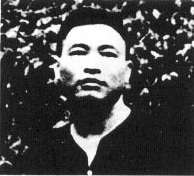Trần Độ
Trần Độ (1923–2002) was a Vietnamese politician and Lieutenant General of the People's Army of Vietnam. He was expelled from the Communist Party of Vietnam due to his opposing and critical opinions of the party and the state of Vietnam, particularly during post-Vietnam War.[1]
Trần Độ | |
|---|---|
 | |
| Vice Chairman of the 8th National Assembly of Vietnam | |
| In office 19 April 1987 – 19 July 1992 | |
| Chairman | Lê Quang Đạo |
| Head of the Central Commission on Culture | |
| In office 1986–1989 | |
| Preceded by | Hà Xuân Trường |
| Succeeded by | Trần Trọng Tân (as Head of the Central Ideology and Culture Department) |
| In office 1980–1982 | |
| Preceded by | position created |
| Succeeded by | Hà Xuân Trường |
| Deputy Minister of Culture | |
| In office 1976–1980 | |
| Minister | Nguyễn Văn Hiếu |
| Deputy Head of the Central Propaganda Commission | |
| In office 1976–1980 | |
| Head | Tố Hữu |
| Vice Chief of the General Department of Politics of the People's Army of Vietnam | |
| In office 1974–1976 | |
| Chief | Song Hào |
| Vice political commissar of the Central Military Commission for South Vietnam | |
| In office October 1963 – 1975 | |
| Personal details | |
| Born | Tạ Ngọc Phách 23 September 1923 Tây Giang, Tiền Hải, Thái Bình, French Indochina |
| Died | 9 August 2002 (aged 78) Hanoi, Vietnam |
| Political party | |
| Awards | Order of Ho Chi Minh Military Exploit Order (1st class, 3rd class) |
| Military service | |
| Nickname(s) | Chín Vinh (nom de guerre) |
| Allegiance | |
| Branch/service | People's Liberation Armed Forces of South Vietnam |
| Years of service | 1941-1986 |
| Rank | |
| Battles/wars | Vietnam War |
Biography
His real name was Tạ Ngọc Phách. He grew up in Thái Bình Province. His father worked for bureau of interpretation in Hanoi, a quite high social status.
In 1939, he became a journalist in Hanoi. He was captured by the French that year but then released due to lack of evidence.[2]
He joined the Communist Party of Vietnam in 1940. At the end of 1941, he was captured again. This time, he was sentenced to 15 years imprison. Late 1941, from Hoa Lo (Hanoi), he was exiled to Sơn La. Here, he was in prison with Lê Đức Thọ, Xuân Thuỷ,... In 1943, on prison move to Côn Đảo, he escaped, continuing revolution activity. He led the protest in and started his military career.[3] He had went south to join the Central Office for South Vietnam and served as the commander during the Tet Offensive assault upon Saigon.
Activities in military
1946 - He was a leader of Hanoi in the field of National Defense against the French.
1950 - Major General
1964 - He went to South Viet Nam to set up military for war with Vietnam Republic, being the deputy command-in-chief.
1974 - Lieutenant General
1974 to 1976 - Vice President of Central Commission of Politics.
Reform view
As a leader of national culture (after the war, he worked in the culture section), he wanted to give it more freedom. He is aware that culture without freedom is dead and culture with only propaganda is also dead. The more control, the more deadly culture is and the rarer valuable masterpiece.
In terms of Communist Party leadership, he said:" I advocate the leadership role of the Party. However, leadership does not mean dictatorship. History shows that every dictatorship will eventually end up in corruption, rotten society and Party itself."
In his opinion, the underlying cause of negative phenomenon in the Party and the society is partly due to the absolute rule of Communist Party.
He insisted that: Communist Party must give up dictator regime, give power to the national assembly, government. There must be laws allowing freedom for a new party, freedom of speech, journalism laws, publishing. Election laws, forgo the decision jusridiction of the Party.
It is this opinion that resulted in his expulsion from the party.
References
- "Nhìn lại lập trường của Tướng Trần Độ". BBC News Tiếng Việt (in Vietnamese). Retrieved 17 June 2018.
- "Nhìn lại lập trường của Tướng Trần Độ". BBC News Tiếng Việt (in Vietnamese). Retrieved 17 June 2018.
- "Vietnam: A Television History; Tet, 1968; Interview with Tran Do, 1981". openvault.wgbh.org. Retrieved 17 June 2018.